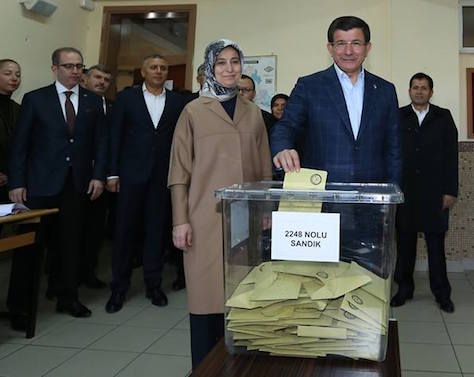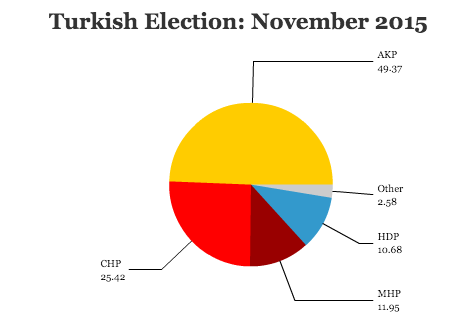
Though there’s plenty to be pessimistic about in the five months since Turkey’s last parliamentary election in June, the result in today’s repeat snap elections is perhaps the best possible outcome for the various domestic and international actors with a state in Turkey’s continued stability.![]()
The Adalet ve Kalkınma Partisi (AKP, the Justice and Development Party), the conservative Islamist party that has dominated Turkish politics since 2002, scored the most crushing victory in its history — more than when it initially came to power and more than its prior peak in the 2011 elections. That’s despite a turbulent election campaign marred by an early October suicide blast in the capital city of Ankara, the deadliest terrorist attack in the history of the modern Turkish republic.

Though the AKP will not win the two-thirds majority that it hoped for to enact the constitutional changes that president Recep Tayyip Erdoğan wants to rebalance powers away from the national assembly and to the presidency, the result gives the AKP a clear mandate to govern without seeking a coalition partner. The AKP’s path to a majority victory wasn’t pretty, and there’s a compelling case that Erdoğan has seriously damaged his legacy and, he further undermined the rule of law, fair elections, internal security and press freedom over the past five months. But the victory means that Turkey will not face a third election in the spring and all the destabilization that another months-long campaign period would mean.
* * * * *
RELATED: Ankara bombing curdles already-fraught
Turkish election campaign
RELATED: How the AKP hopes to regain
its absolute majority in November
* * * * *
Most surprisingly, the AKP managed its overwhelming victory while the leftist, Kurdish-interest Halkların Demokratik Partisi (HDP, People’s Democratic Party) still won enough support to win seats in the national assembly. That feels like something of a miracle, given the increasingly tense atmosphere across southeastern Turkey, where polling took place under conditions of near civil war between Turkish military forces and the radical guerrilla group, the Partiya Karkerên Kurdistanê (PKK, Kurdistan Workers’ Party).
While HDP leader attorney Selahattin Demirtaş has called for a peaceful approach to the fight for greater Kurdish autonomy, AKP officials, including Erdoğan and prime minister Ahmet Davutoğlu have tried to tie the party to the more militant PKK as a years-long ceasefire, the product of advanced peace talks between the Turkish government and PKK leaders, unravelled in July in the wake of a suicide bombing in Suruç (and attributed to the jihadist ISIS/Islamic State/Daesh). Turkey’s hurdle rate for winning seats in the national parliament is 10%. That means, with around 10.6% of the vote, the HDP is entitled to 59 seats, but with just 9.99%, the HDP would have won exactly zero seats. The latter outcome, just five months after the HDP celebrated the first time an expressly Kurdish party won seats in the Turkish assembly, would have greatly undermined Demirtaş’s argument that Turkish Kurds can work through the democratic system for greater autonomy, self-government and other minority rights.
It’s certainly not the outcome Erdoğan would have been hoping for because, had the AKP taken those 59 seats, it would have the elusive two-thirds majority Erdoğan has sought since winning the Turkish presidency last August. In the long run, however, even if Erdoğan dislikes it, it’s much better that the Kurdish minority feels like it can benefit through democratic participation.
An AKP victory that terminates a potentially perpetual campaign season, and a Turkish national assembly that still has a role for the Kurdish minority, is about the best that anyone could have hoped for. It gives Erdoğan and the AKP a chance to try to return to the status quo ante, and it gives Turkey’s government the breathing space to start de-escalating tensions with the PKK, especially because the ISIS/Daesh threat seems so much more pressing. That’s especially true from the US perspective, which wants its NATO ally to assist its efforts to eliminate ISIS/Daesh (which, incidentally, requires cooperation between Erdoğan and the autonomous regional government of Iraqi Kurdistan) and contain Russia’s pesky role in Syria. Internal Kurdish relations are still severely strained, but they are less so than they would have been if the HDP fell below the 10% hurdle rate.
So how did the AKP manage its lopsided win?
There are two components. First, the AKP heavy-handedly depressed turnout among the HDP’s voter base and, second, it managed to steal votes from Turkish nationalists.
The disruptions in the Kurdish-majority southeast almost certainly depressed turnout by reducing the number of open polling stations. The heavy Turkish military presence across the region, too, may have intimidated some voters. While the HDP won around 6.06 million votes in the June elections, its support fell to just over 5 million votes in November. Perhaps a few of those voters switched from the HDP to the AKP, but it is likelier that many of those voters didn’t show up to vote at all. That means that the share of the AKP vote rose proportionally. For example, in Diyarbakir province, the heart of the Kurdish region, the HDP’s share of the vote slipped from around 77.7% to around 71.9%, though turnout was slightly lower (by around 20,000) today than in June.
So even if the AKP had just retained the 18.86 million voters it won in June, it would have improved on the June election. Instead, the AKP attracted more than 23 million votes today.
Support for Turkey’s oldest opposition party, the secular, Kemalist and nominally center-left Cumhuriyet Halk Partisi (CHP, the Republican People’s Party), held up fairly well. It won 11.52 million votes in June, and it won nearly 12 million votes in November, mostly from its strongholds along the Aegean coast and from urban liberals. But it looks like the AKP was far more successful in peeling votes away from the more right-wing, nationalist Milliyetçi Hareket Partisi (MHP, Nationalist Movement Party), which saw its support plummet from 7.52 million votes to just over 5.6 million. Given the hard line that Erdoğan has taken against both ISIS/Daesh and the PKK over the summer and autumn, it makes sense that the AKP would hold more appeal to hard-right Turkish nationalists today than they might have in June.
